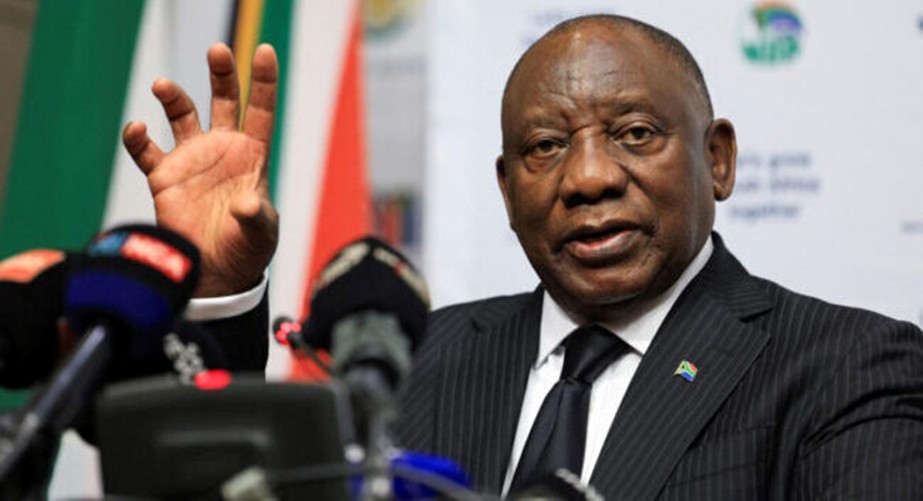In an address on the side lines of the World Economic Forum (WEF) in Davos, Switzerland President Cyril Ramaphosa said South Africa was undergoing a “fundamental transformation”. The country seeks to accelerate inclusive economic growth. The President was delivering his speech at the South Africa World Economic Forum (WEF), held at the Garden Hall in Davos Klosters. On Tuesday evening. The event was hosted by Brand South Africa, and was held in honour of Pretoria holding the G20 rotational presidency this year. This moment creates an extraordinary opportunity to shape the global agenda for inclusive growth and sustainable development. The event was held on the side lines of the annual WEF Summit, which started on Monday 20th of January to 24th January 2025.
The theme for this year’s summit is “Collaboration for the Intelligent Age”. This is an interesting term and highlights the agenda to push the Fourth and fifth Industrial Revolutions such as Artificial Intelligence virtual reality and robotics to the wider public.
Ramaphosa told the gathering that the country has introduced reforms in sectors, including water, electricity and logistics, that are serving as a base for economic growth. “South Africa is undergoing a fundamental transformation. We have introduced bold economic reforms to overcome persistent challenges and unlock the vast potential of our country and its people. “These reforms have underpinned the country’s economic recovery. This in the wake of more than a decade of stagnant growth, state capture and the worst global pandemic in more than a century. These reforms are laying a firm foundation for sustained and accelerated growth into the future,” Ramaphosa said. He added that the reforms, and the subsequent structural transformation, are “sharpening South Africa’s competitive edge, boosting productivity and attracting investment”.
The president pointed to the establishment of the Government of National Unity (GNU). He said this was an example of the commitment from all leaders to maintain “stability, progress and partnership”. This as the country moves towards inclusive growth.
Ramaphosa is looking to compete against other emerging economies by highlighting South Africa’s achievements. His main goal is to preposition the country as Africa’s most significant economy. An economy of large size and highly diversified. South Africa has often portrayed itself as the gate way to southern Africa. Ramaphosa knows that many international investors who are in attendance at Davos are looking for nations with weaker currencies and large economies to invest in. Their main goal is to conserve their wealth while having their returns given back. Ramaphosa for his part offered South Africa as an example of a robust, diverse and democratic economy. The fact that the nation survived the nightmare of covid 19 and the state capture fiasco although during the investigations of which former president Jacob Zuma who had been at the helm had refused to give answers.
The stagnant growth and inflation stemmed from the Covid Pandemic and the abuses of state capture as well as the war in Ukraine. President Ramaphosa is right to argue the GNU is the part to creating peace and security in South Africa. The path accelerated growth has been long and hard but the country has survived. Inclusivity however should mean to include all businesses even small as well as major companies. This should be in terms of growth.
Economists and the Reserve Bank have shifted their views on interest rate expectations in South Africa in the wake of Donald Trump becoming president in the United States. Expectations have shifted from a more rapid but small series of cuts in early to mid-2025 to a much slower fall of only one or two cuts in the entire year. Investec chief economist Annabel Bishop noted that a 25bp cut in the repo rate is expected in the January meeting—an announcement scheduled for 30 January—but no cut at the March MPC meeting, which was the position near the end of last year. The economist said that South Africa’s interest rate cut cycle is expected to slow this year after two cuts in quick succession at the end of last year.
The SARB is not expected to ease interest rates again “until July at least.”
Trump has threatened to hit South Africa with tariffs in his trade war against the BRICS nations. This is in retaliation for any attempt to change the reserve currency from the dollar to a local currency. The cuts by the SARB are meant to reduce interest rates from the early part of the new year to the months in the middle. They are meant to shield the Rand from inflation brought on by the tariffs and lesser rate cuts by Washington. The Trump administration is taking a stern stance on those nations like South Africa for sacrificing the dollar in favour of their own currency. The BRICS nations particularly Russia and Iran have put in place plans to begin trading in their own currencies backed by a single reserve currency in gold. China could be the next to join if it feels embolden too.
South Africa under Ramaphosa is taking a more cautionary approach. As Pretoria looks for ways to protect its exports, it needs to be weary of which side it wants to be on. It won’t be easy but some could argue that South Africa needs its trading partners in southern Africa more than others.
Article written by:
Yacoob Cassim
Journalist at Radio Al Ansaar






